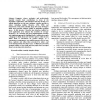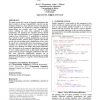16 search results - page 2 / 4 » How to Think Like a Computer Scientist: C Version |
LAWEB
2009
IEEE
13 years 12 months ago
2009
IEEE
—Computer science academics and professionals typically consider their contributions in terms of the algorithms, applications, and techniques that they develop. Yet equally impor...
SIGCSE
2000
ACM
13 years 9 months ago
2000
ACM
Scientific programmers have traditionally programmed in entirely sequential languages such as Fortran, C or Pascal and it could be argued that object-orientation is not a concept ...
AAAI
2006
13 years 6 months ago
2006
Relationships between concepts account for a large proportion of semantic knowledge. We present a nonparametric Bayesian model that discovers systems of related concepts. Given da...
HPDC
2009
IEEE
14 years 2 days ago
2009
IEEE
This paper presents the concept of pluggable parallelisation that allows scientists to develop “sequential like” codes that can take advantage of multi-core, cluster and grid ...
SIGPLAN
2008
13 years 5 months ago
2008
Three key forces are shaping the modern Computer Science (CS) curriculum: (1) new topics/courses are squeezing out existing ones; (2) a focus on "big picture" and interd...


